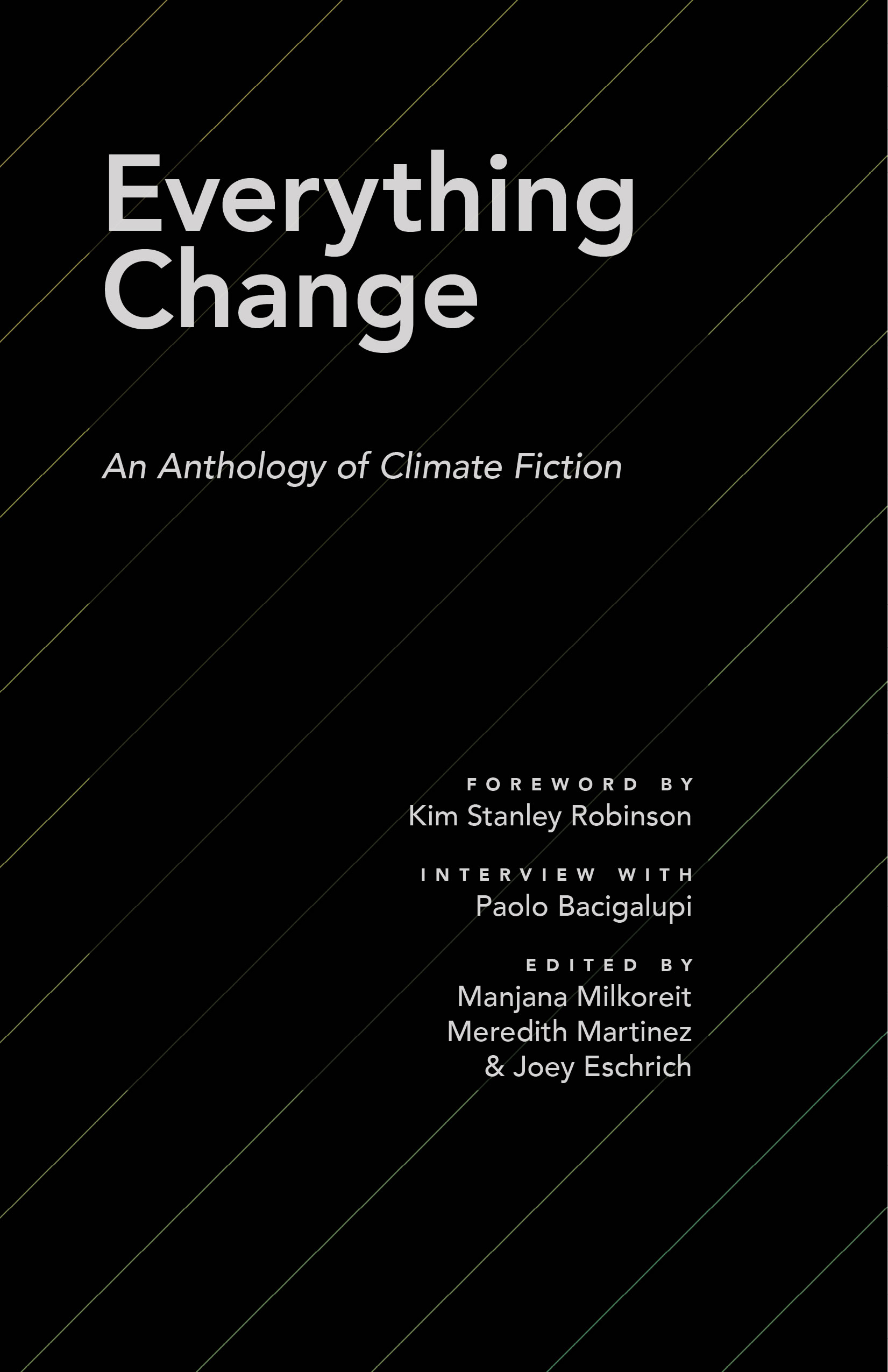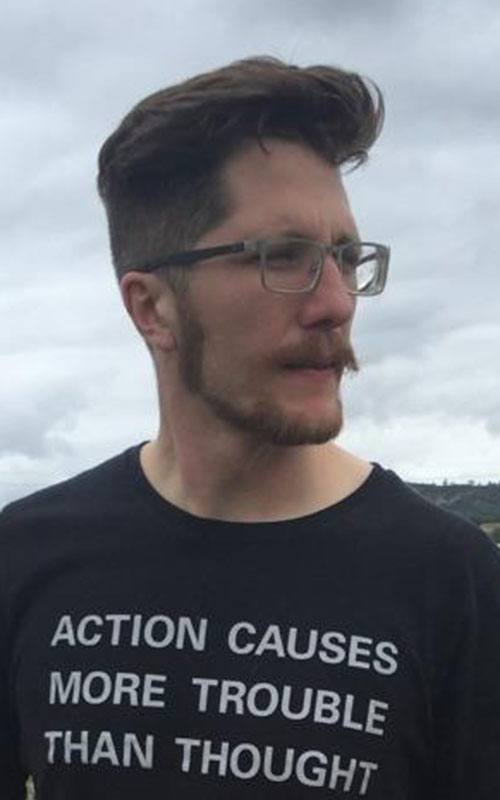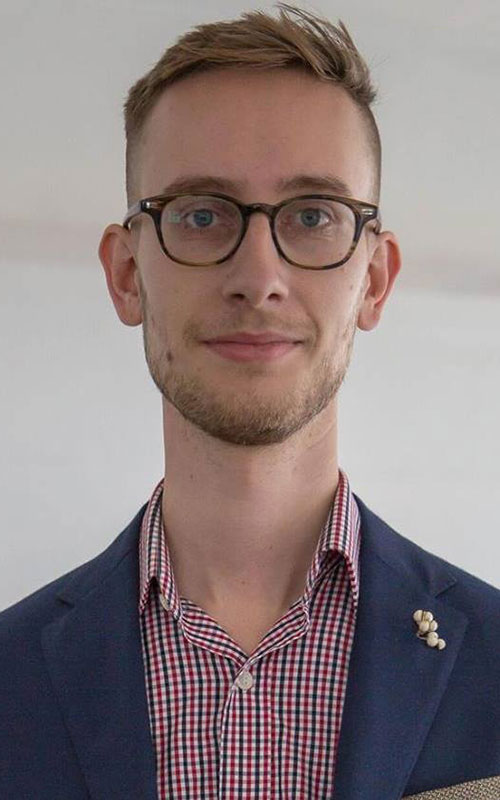Historically, works of fiction dealing with climate change have focused more on visions of the future that include Mad Max-type dystopian societies, starved for resources, on the brink of collapse.
But according to Andrew Hudson, “Disaster situations don’t need to be a nightmare.” For him and collaborator Adam Flynn, it's more creating situations with solvable problems.
That idea carried into their story titled “Sunshine State,” announced today as the winner of ASU’s Imagination and Climate Futures Initiative fiction contest.
The 2016 Climate Fiction Short Story Contest challenged writers around the world to create short stories that imagined possible futures for Earth and humanity transformed by climate change. Twelve of those stories are collected in the ICF’s new anthology, “Everything Change,” with a foreword from sci-fi legend Kim Stanley Robinson and an interview with New York Times best-selling author of climate fiction novels Paolo Bacigalupi.
Find a free download of the anthology, along with the entire list of winners, at climateimagination.asu.edu/everything-change.
Hudson, who works in communications for a health-care nonprofit, and Flynn, a freelance design strategist, both hail from Oakland, California. Their story centers on a group of misfits, hackers and artists working together on a gonzo ecological project in the Florida Everglades to combat sea-level rise, preserve biodiversity, sequester carbon and naturally filter and desalinate seawater.
The narrative straddles the line between hope and despair, leaning more toward the former.
“My interest is in how to tell new stories of the future that get people to address the idea of climate change without shutting down,” said Flynn. “It’s very easy to tip over into a world of gloom and doom.”
Contest runner-up is Matt Henry, an English lit grad at ASU, whose story “Victor and the Fish” tells the tale of a retired ecology professor and fishing guide in a future Montana beset by wildfires, who attempts to secretly revive the native cutthroat trout population out of sight of the state’s Department of Fish, Wildlife and Parks.
“Talking about climate change through fiction is very important to me because it allows me to share my experience with others,” said Henry, who grew up fishing the rivers of his native Montana. “I think that is a route to collective action, being able to empathize with one another.” (See a video of Henry at the end of this story.)
More than 700 submissions were received from 67 countries, and winners were selected through a careful three-round judging process involving Robinson and a diverse panel of expert judges from ASU’s Julie Ann Wrigley Global Institute of Sustainability, Rob and Melani Walton Sustainability Solutions Initiatives, School of Life Sciences, School of Earth and Space Exploration, Department of History, Virginia G. Piper Center for Creative Writing and the Center for Science and the Imagination.
In the end, though, Flynn thinks of himself and Hudson as “just two nerds writing some ideas about the way things might be.”
They spoke more about that with ASU Now:
Question: Your story “Sunshine State” falls into a newer subgenre of sci-fi, known as “solarpunk.” How did you get into that?
Adam Flynn
Flynn: Four years ago I was talking with a friend of mine, [young adult novelist Avery Williams]. We were talking about what to write stories about in 2012. That was at a time when the whole Mayan apocalypse prediction was big news, and everybody was concerned with end-of-the-world stuff. And I realized how fed up and bored I was with stories in which it’s the end of the world; these post-apocalyptic, cyberpunk dystopias. And in my conversation with my friend, she said the phrase “solarpunk,” and I was like, “Whoa, that’s interesting.” So I started collecting news stories and reading about renewable energy, and I wrote a piece for ASU’s Project Hieroglyph advocating for solar punk, and it caught fire.
Hudson: I’ve long been a sci-fi fan, and have spent time thinking about the future and how to tell stories about the future. I read Adam’s manifesto, and we started talking about solarpunk. I sort of took my own spin on it and wrote an essay about it. I was thinking about things like how is climate change affecting demographics and politics? What are the struggles that have to happen along the way before we can get to the part where we all live in this happy solarpunk world?
Q: Your story seems very “real” in that it’s neither overly pessimistic nor optimistic. How did you find a balance?
Andrew Hudson
Hudson: We wanted to tell a story about a more authentic future, as opposed to a utopian one. Because what is the conflict in a utopian situation? What’s the struggle? There isn’t one. So for our story, negotiation was the struggle.
Flynn: Building consensus.
Hudson: Yes, getting people on board with big ideas, and building big, impressive, beautiful things.
Flynn: And not doing so in a “heroic architect” way. Not as one lone genius trying to make something happen. Because we have lots of stories like that. So it was about how to make coalition building into a heroic act, without seeming too self-serious.
Q: Why is climate change important to you, personally?
Hudson: I feel like it’s a struggle I share with everyone else that I can talk about really authentically. It’s something that affects everyone. I am a straight cis white man, and there are a lot of causes I care deeply about but I don’t want to drown out other voices on those issues. But I can talk about climate change.
Flynn: I came of age in Yuma, Arizona, at the far end of the Colorado River. My family has had the good fortune to do what’s called a Diamond down-river trip, in which you go from Diamond Creek downward until you hit the end of the Grand Canyon. The first time we did it in 2002, the last day of the trip was entirely motoring across the lake to pack out. The next time we did it, there was less water running. At another point in 2008, I could see a giant bathtub ring where water used to be. It really affected me. You can’t help but appreciate the fact that nature moves at a different timescale than humans. And when it moves, you better be ready for what’s coming. We need to prepare the future now so that when what every scientist says is coming down the pike comes, we’re ready. We still have a lot of agency as a civilization over how bad this is going to be.
Q: Where does the focus need to be in the current climate-change discussion?
Hudson: We need to start thinking about how do we roll back what we’ve already done? How do we walk back from the cliff of climate change? Not just stop, but come back? We build a habitat that is long-term. That’s where New Wetland comes in, the project we imagined and wrote about in the story.
Flynn: There are a lot of ideas being tossed around right now, things like re-wilding. Somebody has even proposed the idea of bringing back the woolly mammoth to tamp down grass in the Great Plains.
Hudson: Things that would naturally reinvigorate the environment. We live in the Anthropocenerelating to or denoting the current geological age, viewed as the period during which human activity has been been the dominant influence on climate and the environment, we’re going to be in that age forever, that won’t change. So we need to make the Anthropocene one we can actually live in.
Flynn: Right. How can we as humbly as possible mitigate the damage and recognize where we fit into the ecosystem?
Q: How does the topic of climate change fit into the genre of sci-fi?
Hudson: There’s no way you can do sci-fi without talking about climate change.
Flynn: Not even in like, 1993.
Hudson: You can’t tell these stories about people in spaceships and all that without climate change. You gotta explain to me what happened to Earth.
Flynn: And there are people who’ve done that well. There’s Octavia Butler, Ursula Le Guin.
Hudson: There are also things coming out of social-justice perspectives. I’m a big fan of Bruce Sterling and Margaret Atwood, though her work is pessimistic; she doesn’t tell stories in which there’s much redemption. Sci-fi can do a couple of things: It can show you places you don’t want to go, and it can show you places you do want to go, and ways to get there. That’s more what we’re trying to do while staying in the reality of the 21st century.
Flynn: It’s interesting when you look at the late 1800s. There wasn’t a big division between subjects people were writing about. People wrote about the future, science, politics, and it was all kind of mixed together. You had Jules Verne and H.G. Wells, who had a very strong political point of view. You had William Morris, the founder of the Arts and Crafts movement, who wrote the book “News from Nowhere,” a tale of a utopian future. What we need is more ideas and not fewer. We need to flex our imaginations and read about climate change, read about anthropology, read about history. We need to get a broader perspective, instead of just focusing on the time and place we’re in right now.
Q: The anthology is titled “Everything Change.” How does your story address that?
Hudson: That theme is really coming to the fore right now; everyone is trying to express this. For us, it’s a matter of trying to show the details of what material reality is like when you have airport runways underwater and you have to build runways on things that float.
Flynn: And there’s people wearing mosquito nets waiting to get into clubs. That was written way before the Zika outbreak.
Hudson: Reality very quickly outpaces sci-fi and what we can imagine. All this stuff is happening so quickly.
Q: Are you hopeful about climate change when you look to the future?
Flynn: We had the Paris Peace Accords, which were not perfect, and not an entire solution. But it’s our first agreement among every nation to try and do something about climate change. California passed some really impressive goals aimed at emissions targets. They’re aiming by 2050 to be 80 percent below 1990 emissions levels. That’s thinking big. But I have a feeling that there’s going to be a period of slow-moving inaction followed by a rapid, almost WWII-style mobilization. And I just hope it’s in time.
Hudson: Yeah. I think a big difference between younger generations and older ones is that climate change was always a political issue for the older generations. It’s really hard to get out of the mind-set of thinking about climate change in terms of politics. This is something that is literally happening to us. We’re gonna be here, it’s gonna happen. Things are changing already.
Flynn: You can steer the boat, but we’re already on the river.
Hudson: This is gonna be something that is a part of every consideration, every policy, on the whole planet. Everybody is going to have to deal with the reality that the sky is scary-looking now.
Flynn: There’s a Naomi Klein book called “This Changes Everything,” which looks at capitalism’s effect on climate change. It’s an excellent book for someone wanting to start learning more about climate change but who may also be asking, “So what?”
Hudson: Someone once said that it is easier to imagine the end of the world than to imagine the end of capitalism. We gotta prove that wrong. If we don’t break that particular axiom, we’re in big trouble.
Runner-up and ASU English student Matt Henry on writing and his story
Video by Ken Fagan/ASU Now
More Science and technology
From wanna-be high school math teacher to Regents Professor
It’s a bit difficult to describe the work Stephanie Forrest does as director of Arizona State University’s Biodesign Center for Biocomputation, Security and Society.Her ASU biography lays it out this…
Regents Professor recognized as pioneer in educational technology
Reading can transport people around the world — and back and forth in time.That’s what Danielle McNamara has helped tens of thousands of students do.McNamara is the executive director and…

Professor’s expertise in technology transfer leads to top faculty honor
Universities spend billions of dollars on research, and the process of transforming that work into goods and services for the public is more important than ever.ASU Professor Donald Siegel is an…



